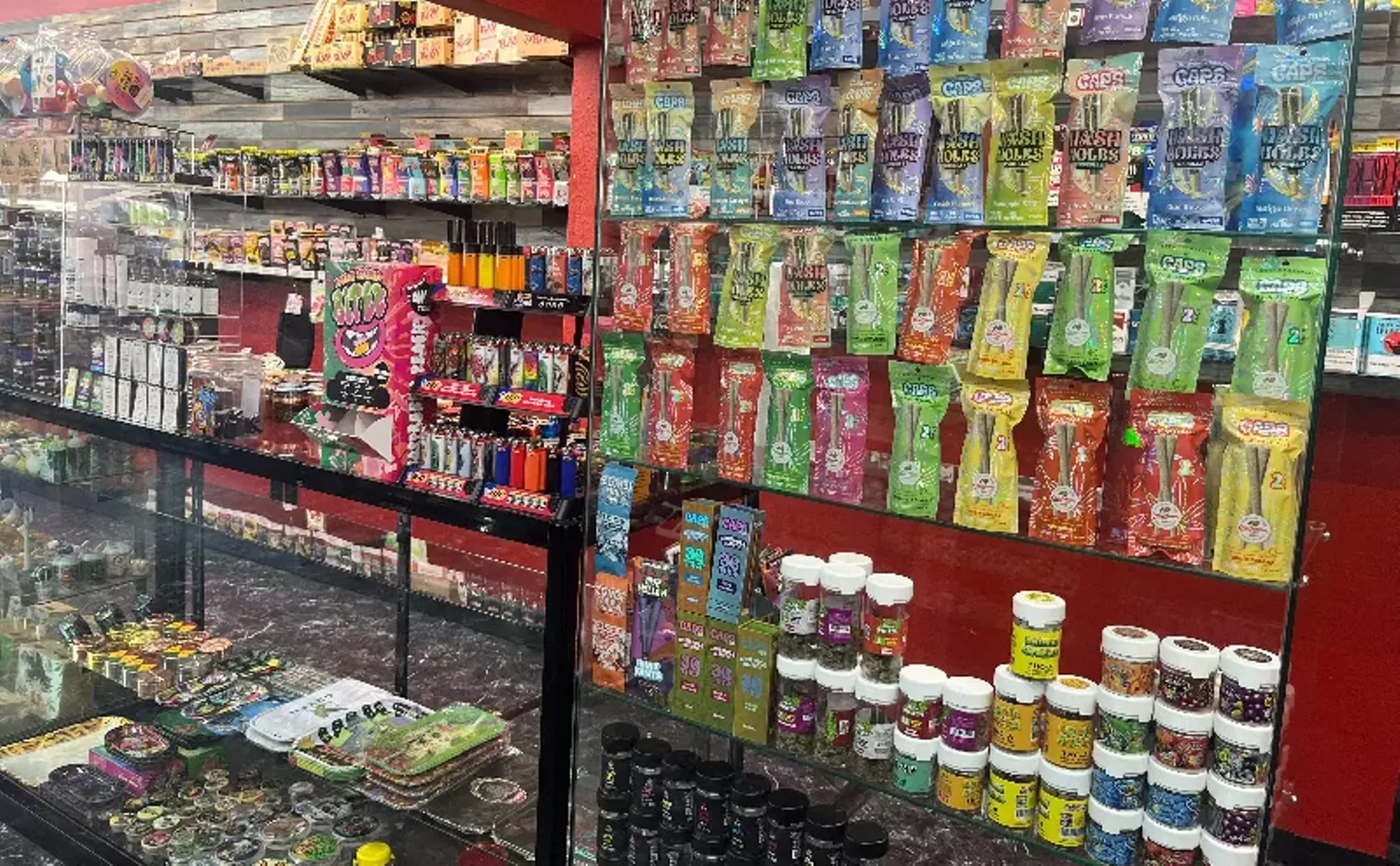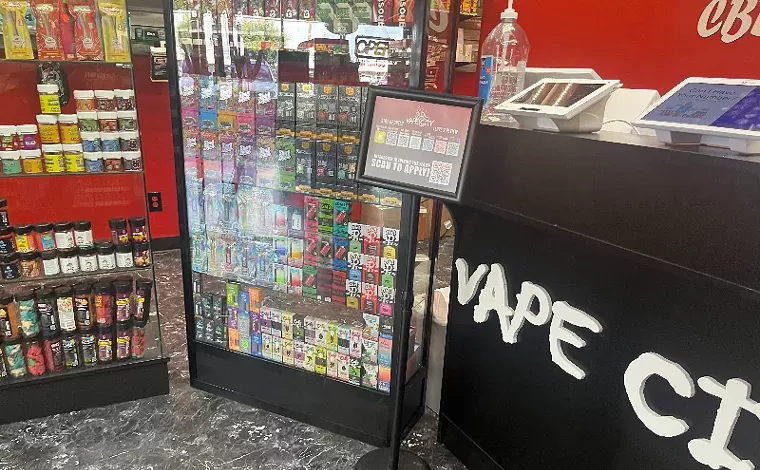Why does Lt. Gov. Dan Patrick hate weed so much, when there’s a fentanyl crisis and alcohol is linked to more deaths and health problems?
That was the topic of discussion Monday morning at Vape City smoke shop in West Houston. The retailer is one of thousands that sell, among other things, hemp-derived THC products that came close to being banned statewide until Gov. Greg Abbott vetoed the controversial Senate Bill 3 minutes before the midnight deadline Sunday.
Patrick, who has pushed for a THC ban for years, says the products are unregulated and potentially harmful to children. Opponents say a ban would obliterate Texas’ $8 billion hemp industry, wipe out 50,000 jobs, and force thousands of small businesses to shutter, moving those dollars into the hands of medical marijuana companies that lobbied heavily for the ban.
A cashier at Vape City, who asked not to use her real name, said hemp-based products are their top sellers. They’re primarily purchased by people over 40 years old who are going through chemotherapy or chronic pain, the cashier said. Some use gummy hemp products to help them sleep or ease anxiety, she said. A THC ban would not affect Texas’ Compassionate Use Program, which allows the sale of low-level THC products for medical purposes.
As for regulation, Houston smoke shops rigorously check ID but they don’t limit the amount of THC products being purchased, the Vape City cashier said.
Customers at Houston’s Vape City, a 24-hour smoke shop, were excited Monday about Governor Abbott’s veto of Senate Bill 3.
Photo by April Towery
If the THC ban is really about regulation and not lining the pockets of the medical marijuana lobby, Patrick will have a chance to plead his case when the Texas Legislature returns for a month-long special session on July 21.
THC users at Vape City said their assessment of Patrick’s hatred for weed came from the lieutenant governor’s aggressive push for the ban.
“It just seems like he’s going really hard after marijuana when there are other things, like alcohol, that cause more deaths,” one customer said. “If they ban Delta-8 [THC] products, that will force some people into an opioid addiction, which is a much bigger deal than hemp.”
Patrick expressed his disappointment Monday in an Austin press conference.
“[Abbott’s] late-night veto, on an issue supported by 105 of 108 Republicans in the legislature, strongly backed by law enforcement, many in the medical and education communities and the families who have seen their loved ones’ lives destroyed by these very dangerous drugs, leaves them feeling abandoned,” Patrick wrote on social media.
“I feel especially bad for those who testified and poured their hearts out on their tragic losses,” he added.
Some of the regulations proposed in Governor Abbott’s veto include mandating childproof packaging and limiting the distance between a smoke shop and schools, churches, or playgrounds. Additionally, a regulatory law could mandate tracking of permitting and registration for THC producers and monitoring enforcement of whatever law ends up on the books.
Brandon Rottinghaus, a political science professor at the University of Houston, said he was up late Sunday night refreshing the Texas Legislature Online webpage to see if Abbott would veto the bill. If the governor had taken no action by the deadline, it would have become law by default.
“I was surprised he vetoed it,” Rottinghaus said. “The veto message implied that he thought that the litigation on the battle to implement SB 3 would be so long that it might hinder efforts to try to make the product safer and regulatorily sound.
“I think the other thing is the business side. We’ve seen Republicans gravitate away from the business side of the Republican Party in the last few years. This implies that those groups are still influential within Republican circles.”
Rottinghaus added that he suspects the decision was “a bit agonizing” for the governor because he had to go against Patrick after a session where they’d had a lot of mutual success.
“At the end of the day, business interests prevailed and the cost of litigation in terms of money and time was something that was obviously on [Abbott’s] mind,” Rottinghaus said.
THC regulation is one of six “initial items” on Abbott’s special session agenda. Redistricting is not on the list yet, but the governor is under pressure from Donald Trump to redraw geographical boundaries and can still add it.
For now, the items up for discussion when the legislature reconvenes include six bills Abbott vetoed and wants to refine:
- SB 3: Regulate products derived from hemp, including consumable hemp products and the hemp-derived cannabinoids they contain.
- SB 648: Amends the Texas Property Code to introduce stricter requirements for recording real property documents, particularly those filed by individuals not acting as real estate professionals.
- SB 1253: Incentivizes water conservation by requiring political subdivisions to offer credits against water and wastewater impact fees for builders and developers who implement water-efficient infrastructure and appliances.
- SB 1278: Aims to protect victims of trafficking and prostitution from further revictimization by the criminal justice system and aligns Texas law with a more nuanced understanding of trauma and coercion, especially in cases of sex trafficking.
- SB 1758: Restricts the permitting of cement and aggregate production facilities near semiconductor wafer manufacturing facilities, specifically in Grayson County.
- SB 2878: Addresses the jurisdiction and procedures of county courts at law in Bowie County.
Aside from the THC ban, none of those vetoed bills is particularly exciting or expected for a special session, Rottinghaus said.
“The list of bills seemed formulaic and was designed to tweak some of the laws that [Abbott] had minor issues with,” Rottinghaus said. “I think redistricting is very likely to be on the call. Exactly when he puts it there is the question. The Democrats are watching carefully to see if they should come or not. In some ways they’ve got leverage because they’ve got numbers and they have to be present for the lege to operate.”
Rep. Gina Hinojosa, D-Austin, was one of the first to weigh in on the THC veto on social media.
“Let me get this straight, so I’m supposed to show up for a special session this summer to ban THC?” she wrote.
Houston Democrats Molly Cook and Gene Wu and Republican Paul Bettencourt, who’s listed as a co-author on SB 3, were silent on the special session call Monday morning. Houston Democrat Sen. Carol Alvarado wrote on X around 1 a.m.: “Special #txlege session? Insomnia just kicked into high gear. Lord. Anyone else awake?”
Rottinghaus said Abbott’s strategy may be to have a carrot and a stick as he calls the legislature back into session.
“The carrot is THC reform, which Democrats would generally be in favor of, and the stick is redistricting,” he said. “I don’t know that the governor has to put redistricting on this special call or he could add it while they’re meeting. It’s possible that he could pull a bait and switch [and say], we’re going to talk THC reform and then everyone shows up and he says, here’s one more thing. At that point, it becomes a cat and mouse game.
“The biggest problem he’ll confront with the special [session] is whether Democrats show up,” Rottinghaus added. “He’s got to be able to manage this in a way that allows that to happen and to get the stuff passed that he wants.”

